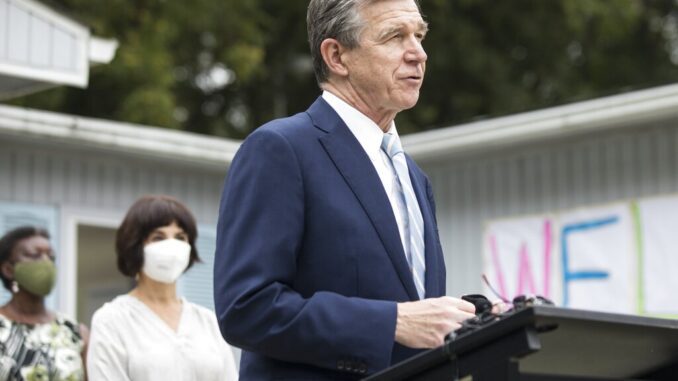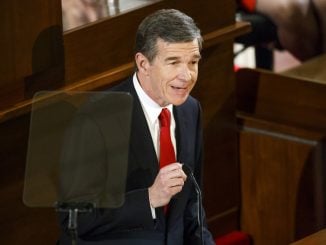
RALEIGH — A landmark energy measure for North Carolina that aims to dramatically reduce power plant greenhouse gas emissions received final legislative approval Thursday, despite lingering concerns by some that customers aren’t helped sufficiently with higher electricity bills.
The House voted 90-20 for the consensus legislation, which was largely worked out by state senators and Democratic Gov. Roy Cooper. With the Senate already voting overwhelmingly for the measure Wednesday, the bill was sent to Cooper for his expected signature.
“The strong bipartisan vote for the energy bill is a win for people all across North Carolina who will benefit from clean, renewable and reliable energy that is more accessible for everyone and better for the environment,” Cooper said in a statement after the vote.
The negotiated agreement tells the North Carolina Utilities Commission, with input from utilities including market-dominant Duke Energy, to draw up a plan by the end of next year to meet carbon dioxide reduction goals that Cooper has championed. Cooper’s previously identified targets would reduce energy producers’ C02 output 70% from 2005 levels by 2030, and achieve zero-net CO2 emissions by 2050.
An earlier version written by House Republicans and approved in July had no such directed goals, although utility researchers said it would have contributed to a 62% reduction in C02 emissions by the end of the decade. That version — criticized by Cooper, environmental and business groups — had identified which coal-fired plants should be retired and how much additional solar production was needed.
At least 16 states have passed legislation establishing greenhouse gas emissions reduction requirements, according to the National Conference of State Legislatures. Most are in the Northeast and West regions.
The final bill also gives Charlotte-based Duke Energy the ability to seek multiyear rate increases and performance-based earnings incentives from the commission. The panel can issue three-year rate plans and cap base rate increases during the second and third years at 4%. Duke Energy unsuccessfully sought the alternative rate-making process two years ago.
Some bill supporters said this week that the final version will help North Carolina do its part to counter climate change, which scientists largely blame on carbon dioxide generated by humans. Other House Republicans said on Thursday that they would back the bill because interests back home — farms, electric cooperatives and economic recruiters — supported it.
“This is certainly a bill that everyone can vote and have a good conscience about,” said Rep. Jimmy Dixon, a Duplin County Republican and retired farmer.
But several environmental organizations failed to endorse the measure, saying it fell short by allowing for delays in meeting the carbon-reduction targets or by giving too much power or profits to Duke Energy.
“This compromise is an improvement over the original bill, and we want to thank Gov. Cooper for going to bat for North Carolinians,” Dan Crawford with the North Carolina League of Conservation Voters said this week, but “we can’t squeeze our noses hard enough to support it.”
While some increases in residential and industrial power bills are expected from enacting the legislation, the scope of such rate hikes remains unclear, in part because the bill identifies no required mix of alternative fuel sources such as natural gas, solar and nuclear.
Republicans have said there were several provisions that would rein in electric bills, chief of which is that the commission must follow the “least cost path” in reaching the targeted percentages. Some House Democrats said Thursday that those items didn’t go far enough.
“I would love to vote for this bill. But in the final analysis, I have to decide for my ratepayers and not for some of the people in my district who can not worry about how much their energy costs,” said Rep. Mary Belk, a Mecklenburg County Democrat who voted no.
Meanwhile, Rep. Larry Pittman of Cabarrus County, the lone Republican speaking against the bill, said he found the idea that climate change is caused by human activity “a farce and a fraud.”
Otherwise, large majorities of both parties voted for the measure, handing GOP legislative leaders and Cooper rare simultaneous victories.
“The compromise wasn’t on the shared goals of carbon reduction, assured energy costs and reliability, but the mechanisms to get there,” said Rep. Dean Arp, a Union County Republican and co-author of the House version.



